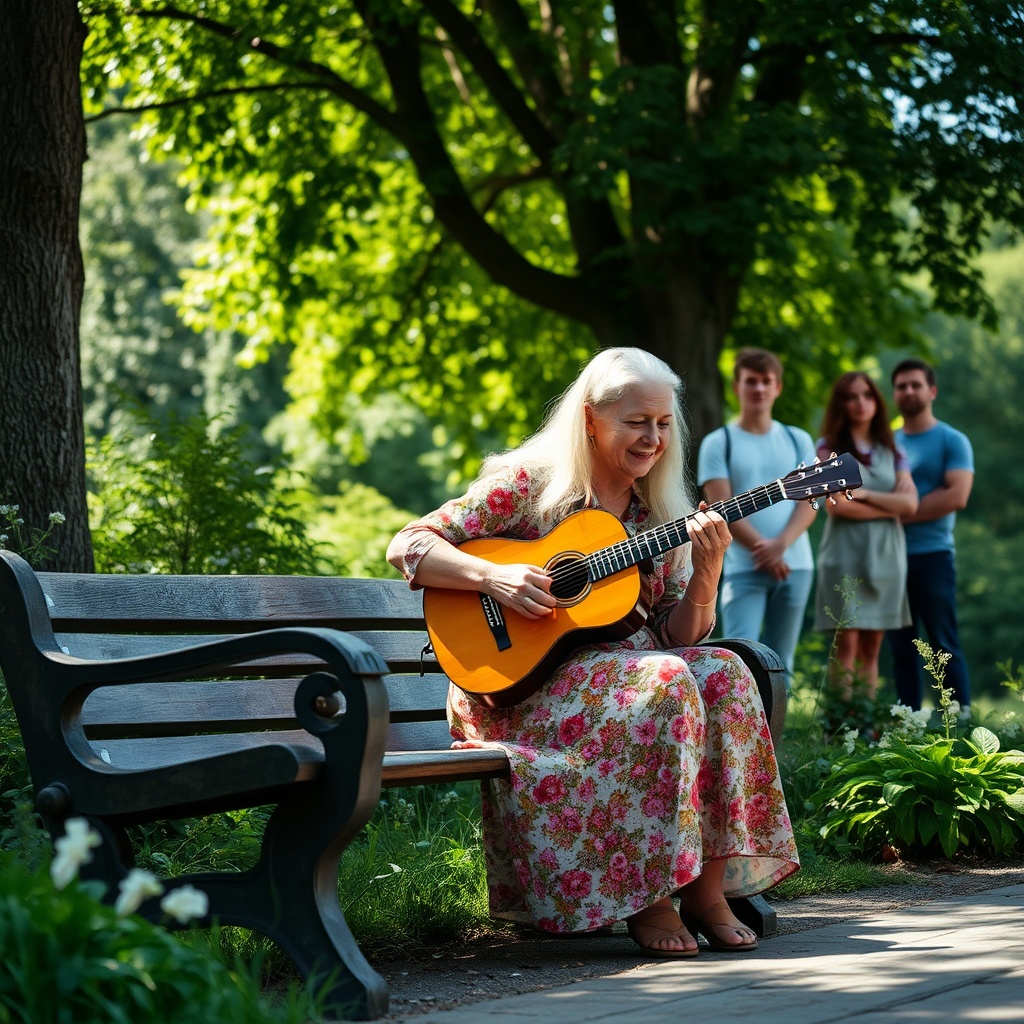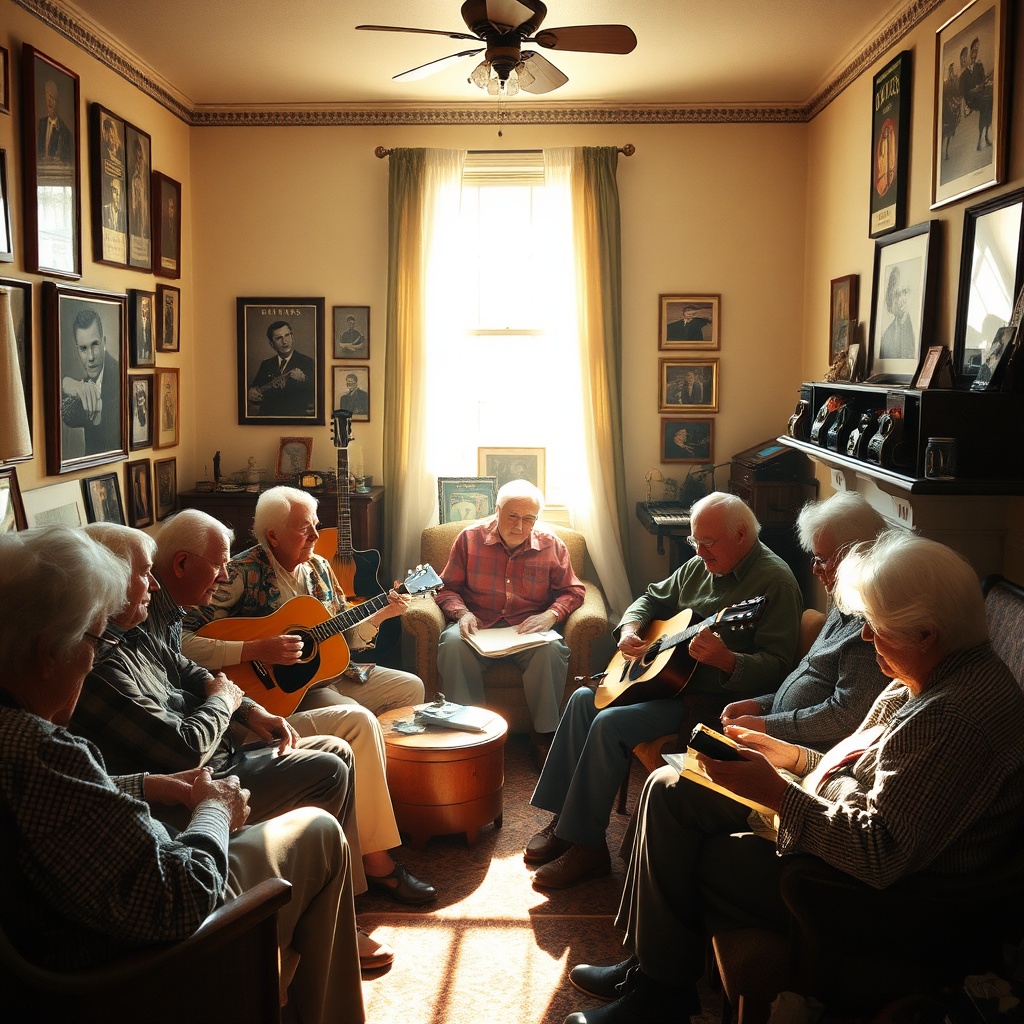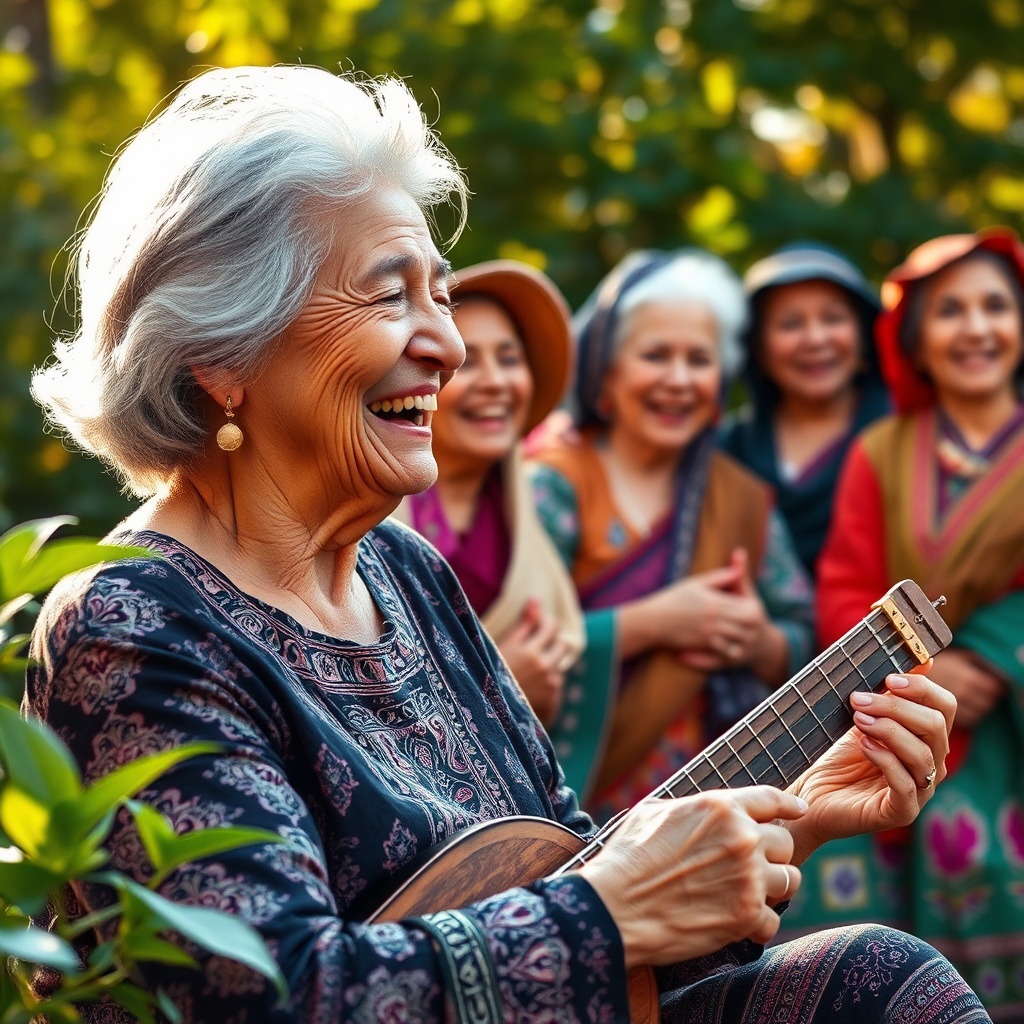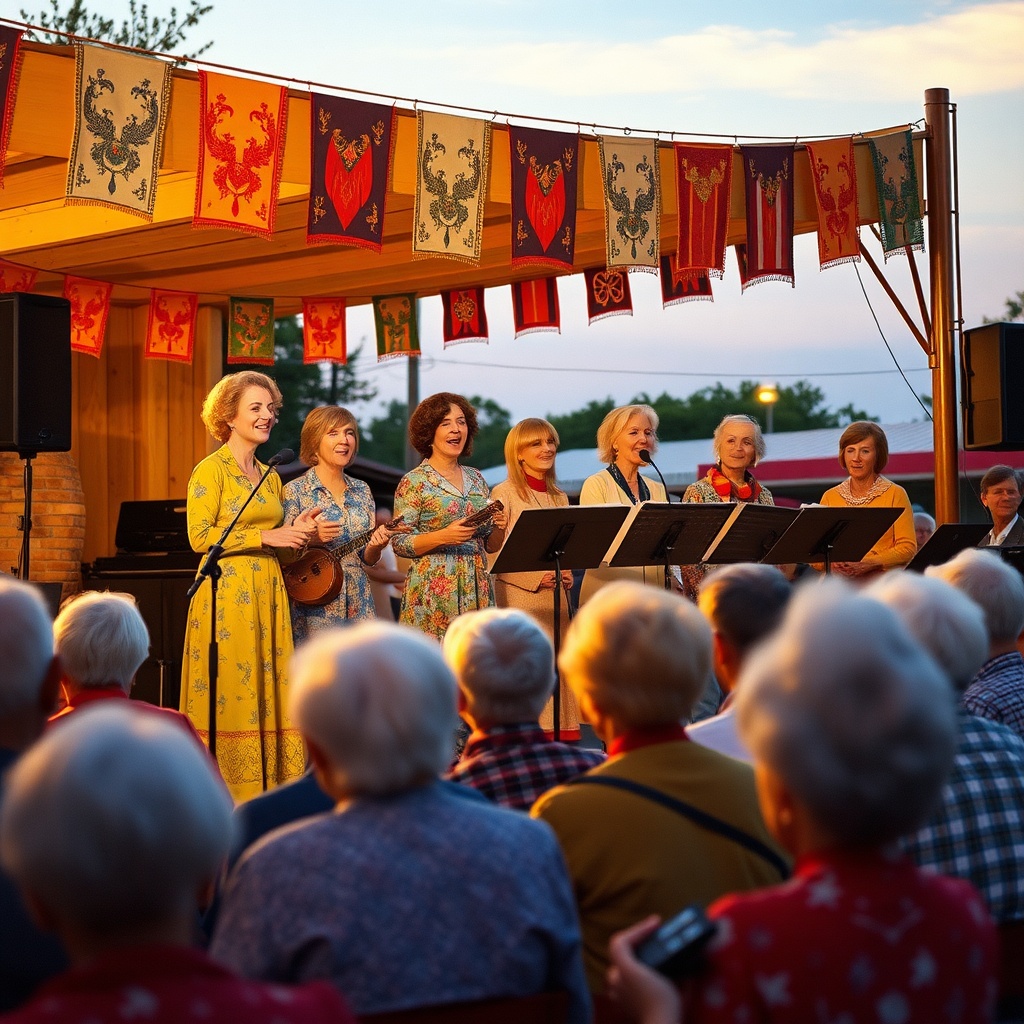Echoes of Change: How 1960s Female Folk Singers Shaped a Generation

In the 1960s, a wave of female folk singers emerged, not just to entertain, but to ignite change and inspire a generation. Their songs echoed the struggles and triumphs of women, and their influence can still be felt today. Let’s explore how these powerful voices shaped society.
The Rise of Folk Music
The folk music movement blossomed during the 1960s, fueled by social change and a desire for authenticity. Female artists played a crucial role in this cultural shift.
Key Figures
- Joan Baez: Known for her striking voice and activism, Baez was a symbol of the peace movement.
- Joni Mitchell: With her poetic lyrics, Mitchell explored complex themes of love, loss, and identity.
- Odetta: Often called the “Queen of American Folk Music,” Odetta’s performances were filled with passion and historical significance.
Thematic Resonance
Female Empowerment: These singers tackled themes of equality and self-expression, urging women to find their voices.
Social Justice: Many songs addressed civil rights and anti-war sentiments, connecting personal struggles to broader social issues.
Impact on Society
The music of these female folk singers resonated deeply with audiences, providing a soundtrack for the changing times. They encouraged listeners to engage with political issues and fostered a sense of community.
Legacy
The influence of 1960s female folk singers continues to inspire artists today. Their courage and creativity paved the way for future generations, ensuring that their messages of resilience and empowerment endure.
Reflecting on the contributions of these artists reminds us of the power of music in instigating change. The echoes of their voices continue to inspire, challenge, and resonate with us all.
Harmonies of Hope: The Unforgettable Stories Behind Iconic Folk Anthems

Introduction to the Folk Era
During the 1960s, a wave of female folk singers emerged, using their voices to challenge societal norms and inspire change. These women became the heartbeat of a generation, weaving their personal stories into the fabric of iconic anthems.
Key Figures in Folk Music
Let’s take a moment to explore some of the legendary female folk singers who left an indelible mark on music and culture:
- Joan Baez – Known for her clear voice and socially conscious lyrics, she became a prominent figure in the civil rights movement.
- Joni Mitchell – With her poetic storytelling, she captured the complexities of love and life, resonating with many listeners.
- Odetta – Often referred to as the “Voice of the Civil Rights Movement,” Odetta’s music inspired generations with its powerful messages.
- Buffy Sainte-Marie – A pioneering Indigenous artist whose songs addressed social justice and Indigenous rights.
The Power of Lyrics
The lyrics of folk songs often reflect deep emotions and societal issues. Here are some memorable lines that have become anthems of hope:
| Song Title | Artist | Key Message |
|---|---|---|
| “We Shall Overcome” | Joan Baez | Unity and perseverance in the face of adversity. |
| “Big Yellow Taxi” | Joni Mitchell | Environmental awareness and the impact of modernization. |
| “If I Had a Hammer” | Peter, Paul and Mary | Social justice and equality. |
| “Universal Soldier” | Buffy Sainte-Marie | The futility of war and the soldier’s plight. |
Personal Stories Behind the Songs
Each song often has a story that resonates with the struggles and triumphs of the artists:
- Joan Baez shared her experiences at civil rights rallies, turning her pain and hope into music that united people.
- Joni Mitchell‘s “A Case of You” reflects her tumultuous relationships, making it relatable to anyone who has loved deeply.
- Odetta drew from her own life as a Black woman in America, her songs echoing the fight for equality.
- Buffy Sainte-Marie often wrote about her own heritage, bringing Indigenous issues to the forefront through her music.
The Legacy Continues
These female folk singers not only shaped the music of their time but also paved the way for future generations. Today, their influence can be seen in the work of contemporary artists who continue to tell powerful stories through song.
Engage with the Music
As we reflect on these harmonies of hope, consider revisiting some of these timeless songs. Share your own memories associated with them or discuss how their messages resonate in today’s world.
The female folk singers of the 1960s remind us of the power of music as a tool for advocacy and expression. Their unforgettable stories and iconic anthems continue to inspire resilience and hope across generations.
Melodies of Resistance: Celebrating the Empowering Voices of Women in Folk Music

Introduction to the Era
In the vibrant tapestry of the 1960s, a significant movement emerged within folk music, giving rise to powerful voices that resonated with themes of resilience and empowerment. Women folk singers played a crucial role in this transformative period, using their melodies to challenge societal norms and inspire change.
The Rise of Female Folk Singers
During the 1960s, the folk music scene became a platform where women could express their experiences and struggles. Artists like Joan Baez, Judy Collins, and Nina Simone not only captivated audiences with their enchanting voices but also became symbols of the fight for civil rights and gender equality.
Melodies of Resistance
These singers intertwined their personal stories with the broader narratives of social justice. Their songs often addressed issues such as:
- War and Peace: Many women used their music to protest against the Vietnam War, highlighting the impact of conflict on families and communities.
- Equality: Lyrics advocating for women’s rights and challenging patriarchal norms became anthems for the feminist movement.
- Racial Justice: Several folk singers collaborated with civil rights activists, using their platforms to raise awareness about racial inequality.
The impact of these women extended far beyond music. Their courage and determination inspired countless individuals to join movements for change. The melodies they created became a soundtrack for activism, sparking conversations that continue to resonate today.
Interactive Reflection
Reflecting on this era, consider the following:
- Which female folk singer resonates most with you, and why?
- How did their music influence your perspective on social issues at the time?
- What lessons can we learn from their resilience and activism today?
The voices of female folk singers from the 1960s remain a testament to the power of music as a tool for resistance and empowerment. Their legacies continue to inspire new generations of artists and activists, reminding us that melodies can indeed shape the course of history.
The Power of Song: Discovering the Impact of 1960s Female Folk Legends
During the 1960s, a vibrant wave of music swept across the globe, with folk music emerging as a powerful voice for change. This era was marked by social upheaval, civil rights movements, and the quest for gender equality. Female folk singers played a pivotal role in this movement, using their music to inspire, educate, and unite.
Influential Voices
Let’s take a moment to reflect on some of the legendary women who shaped the folk music scene:
- Joan Baez: Known for her angelic voice and unwavering commitment to social justice, Baez became the face of the folk revival. Her songs often spoke of peace and love, resonating deeply with the youth of her time.
- Joni Mitchell: A prolific songwriter, Mitchell’s lyrics captured the complexities of life and love. Songs like “Both Sides, Now” showcased her ability to convey profound emotions in simple melodies.
- Pete Seeger: While not female himself, Seeger’s influence on female artists cannot be understated. His encouragement and collaboration with women musicians helped raise their profiles and brought their messages to wider audiences.
The Impact of Their Music
Music has an extraordinary ability to evoke feelings and memories. The songs of these women transcended mere entertainment; they became anthems of resilience. Let’s explore how their music impacted society:
- Empowerment: Many songs addressed the struggles women faced, empowering listeners to stand up for their rights.
- Social Change: Songs like “We Shall Overcome” became rallying cries during the Civil Rights Movement, showcasing the power of music in promoting social justice.
- Community Building: Folk music brought people together, fostering a sense of community among those fighting for change.
Think about the songs that have touched your heart. What memories do they bring back? How did they inspire you during difficult times? Share your thoughts with those around you, and perhaps even sing a few lines together.
Legacy of Female Folk Singers
The legacy of these female folk legends continues to influence artists today. Their messages of resilience, hope, and social justice remain relevant, encouraging new generations to use their voices for change.
As we celebrate the voices of the past, let us remember the power of song in shaping our world. The female folk singers of the 1960s not only changed the music landscape but also paved the way for future generations to express themselves and advocate for a better society.
Legacy of Courage: How Female Folk Singers Inspired Social Movements
In the turbulent 1960s, a remarkable group of women emerged as the voices of change, using their music to challenge societal norms and inspire action. Female folk singers like Joan Baez, Pete Seeger, and Judy Collins not only entertained but also became beacons of hope and resilience.
The Power of Music
Music has always been a powerful tool for storytelling and expression. These women harnessed that power, using their songs to address issues like civil rights, war, and gender equality. Can you recall any songs that moved you deeply during that time?
Joan Baez: The Voice of a Generation
Joan Baez’s haunting voice became synonymous with the peace movement. Her rendition of “We Shall Overcome” became an anthem for civil rights. Through her performances, she brought attention to injustices and rallied support for the movement. What memories do you have of her music?
Judy Collins: A Catalyst for Change
Judy Collins, known for her ethereal voice, also played a significant role in the social movements of the 1960s. Songs like “Both Sides, Now” captured the complexities of life and love, resonating with many facing societal challenges. How did her music reflect the struggles of the day?
Influence on Social Movements
These female folk singers did more than just sing; they became activists who participated in marches and rallies. Their songs were not just melodies but powerful messages that inspired people to take a stand. Can you think of a time when a song motivated you to act?
The Legacy of Courage
The legacy of these women continues to inspire new generations. Their courage in the face of adversity set a standard for future artists and activists. How do you think their influence can be seen in today’s music and movements?
As we reflect on the contributions of female folk singers from the 1960s, we honor their courage and resilience. Their music remains a testament to the power of art in driving social change. What lessons can we carry forward from their experiences?
Timeless Tunes: A Journey Through the Lives of 1960s Folk Heroines
Introduction to the 1960s Folk Scene
The 1960s was a decade marked by social change, political movements, and cultural revolutions. Among the vibrant tapestry of this era, female folk singers emerged as powerful voices, weaving tales of struggle, love, and hope through their music. This journey explores their lives, influences, and the timeless tunes that continue to resonate.
Key Figures in 1960s Folk Music
Let’s take a closer look at some of the most iconic female folk singers of the 1960s:
| Name | Notable Songs | Impact |
|---|---|---|
| Joan Baez | “Diamonds and Rust”, “We Shall Overcome” | Advocate for civil rights and anti-war movements, her music inspired millions. |
| Joni Mitchell | “Both Sides, Now”, “A Case of You” | Her poetic lyrics and unique voice transformed the folk genre. |
| Pete Seeger | “If I Had a Hammer”, “Where Have All the Flowers Gone?” | Though a male figure, he encouraged many female artists and collaborated with them. |
| Odetta | “This Little Light of Mine”, “Midnight Special” | Known as the ‘Voice of the Civil Rights Movement’, her influence was profound. |
| Emmylou Harris | “Boulder to Birmingham”, “If I Could Only Win Your Love” | Her blend of country and folk music brought new life to the genre. |
The Cultural Impact of Folk Music
Folk music in the 1960s was not just entertainment; it served as a catalyst for social change. Many of these artists used their platforms to address issues such as:
Social Justice: Songs like “We Shall Overcome” became anthems for the civil rights movement.
Anti-War Protests: The folk music community rallied against the Vietnam War, with artists like Joan Baez leading the charge.
Women’s Rights: These singers often spoke about gender equality and their experiences, paving the way for future generations.
As we reminisce about these powerful voices, consider the following:
What songs from this era resonate with you most?
How did the messages of these artists influence your life or beliefs?
Do you remember attending any concerts or events featuring these folk heroines?
The female folk singers of the 1960s not only shaped the music of their time but also left an enduring legacy that inspires today’s artists. Their melodies, stories, and resilience continue to echo through the ages, reminding us of the power of music in advocating for change.
Sisters in Song: The Bonds and Collaborations of Female Folk Artists
Exploring Connections Through Music
The 1960s was a transformative decade for folk music, particularly for female artists who found their voices and created lasting bonds with one another. These women didn’t just sing; they forged a community that celebrated shared experiences and struggles.
The Power of Collaboration
Collaboration among female folk artists blossomed during this era. Joan Baez, Joni Mitchell, and Patsy Cline were not just individual stars; they often came together for concerts, festivals, and recordings. Can you recall any specific performances or albums that featured multiple female artists? Their harmonies created a rich tapestry of sound that resonated with audiences.
Support Systems
These artists acted as support systems for one another, sharing resources and encouraging each other to express their truths. They navigated a male-dominated industry, often lifting each other up in times of adversity. Do you remember how their songs spoke to the challenges faced by women at that time? “I Am Woman” by Helen Reddy became an anthem, symbolizing empowerment and solidarity.
Influence on Future Generations
The collaborations among these female folk singers set a precedent for future generations. They not only inspired other female artists but also created a framework for how women could work together in music. Many of today’s artists cite these collaborations as significant influences. Who are some of your favorite contemporary female artists who may have drawn inspiration from these legends?
Take a moment to reflect on your own experiences with music. Think about the artists who have shaped your understanding of resilience and community. How do you think the bonds formed by these female folk singers have influenced the music you enjoy today? Share your thoughts and let the echoes of their songs remind us of the strength in unity.
Lyrics of Liberation: Exploring the Messages Behind the Music of the 60s
Introduction to the 1960s Folk Music Movement
The 1960s was a transformative decade, marked by social upheaval and a quest for change. Female folk singers emerged as powerful voices, using their music to convey messages of liberation and empowerment. Let’s explore how their lyrics resonated with the struggles of their time.
Lyrics in folk music are not just words; they are stories, emotions, and calls to action. Many songs from this era addressed critical issues such as civil rights, gender equality, and anti-war sentiments. Can you recall any specific songs that stirred your emotions?
Key Female Folk Singers
Artists like Joan Baez, Joni Mitchell, and Pete Seeger (although male, he collaborated with many female artists) played pivotal roles. Their music provided a soundtrack to the movements of the time. For instance, Joan Baez’s rendition of “We Shall Overcome” became an anthem for the civil rights movement. What memories do you have of listening to these iconic singers?
Messages of Liberation
“The times they are a-changin’”—a phrase that encapsulated the spirit of the 60s. The messages in these songs often revolved around:
Social Justice: Many folk singers highlighted the plight of marginalized communities, advocating for equality and justice.
Gender Equality: Female singers used their platforms to challenge traditional gender roles, promoting women’s rights and empowerment.
Peace and Anti-War Sentiments: The Vietnam War sparked widespread protest, and music became a vehicle for expressing dissent.
Let’s take a moment to reflect. What song lyrics from the 60s resonate with you the most? How did they inspire you during your youth? Write them down and share your thoughts with someone who could benefit from your wisdom.
The Legacy of 1960s Female Folk Singers
Today, the influence of 1960s female folk singers continues to echo. Their messages remain relevant as new generations face their challenges. The resilience displayed through their music serves as a reminder of the power of art in driving social change. Which of their songs do you think is most relevant today?
As we celebrate the voices of these remarkable women, let us not forget the lessons their lyrics impart. Music has the power to unite and inspire, and the folk singers of the 1960s showed us just how impactful it can be. Share your favorite lyrics and stories with the younger generation, keeping the spirit of liberation alive.
Voices that Changed the World: The Enduring Influence of Female Folk Singers
In the 1960s, a remarkable wave of female folk singers emerged, using their voices to challenge societal norms and inspire change. Their songs resonated with the struggles of their time, and their legacies continue to influence artists and activists today. Join us as we delve into the lives and impact of these extraordinary women.
During a time of social upheaval, female folk singers became the powerful voices of the civil rights movement, the anti-war protests, and the feminist movement. Artists like Joan Baez, Joni Mitchell, and Odetta not only entertained but also educated and mobilized the masses. Their melodies were woven with messages of hope, resistance, and the quest for justice.
Key Figures and Their Impact
- Joan Baez: A central figure in the folk music revival, Baez used her music to advocate for peace and social justice. Her rendition of traditional songs brought attention to civil rights issues.
- Joni Mitchell: Known for her poetic lyrics, Mitchell’s songs explored themes of love, loss, and identity. Her influence extends beyond folk, inspiring countless musicians across genres.
- Odetta: Often referred to as the ‘Voice of the Civil Rights Movement’, Odetta’s powerful performances galvanized activists and brought folk music into the political arena.
The Songs That Inspired Change
Each of these artists crafted songs that became anthems for change. Consider the impact of:
- “We Shall Overcome”: This song, popularized by many folk singers, became synonymous with the civil rights movement.
- “Big Yellow Taxi”: Joni Mitchell’s critical look at environmental degradation resonates even today.
- “Diamonds and Rust”: Joan Baez’s poignant reflections on love and loss connect with generations.
Continuing the Legacy
The influence of these female folk singers transcends their era. Modern artists, such as Brandi Carlile and Norah Jones, draw inspiration from their predecessors, ensuring that the spirit of their messages remains alive. As we listen to their music, we are reminded of the power of song to evoke emotion, foster connection, and inspire action.
Let us celebrate the voices of resilience that changed the world. The female folk singers of the 1960s not only shaped a musical landscape but also paved the way for future generations. As we reflect on their enduring influence, we invite you to share your favorite songs or memories associated with these iconic artists. Together, we can honor their legacy and recognize the lasting impact of their voices.
Folk Fables: The Untold Stories of Women Who Sang for Change
In the heart of the 1960s, a powerful movement was brewing, led by women who used their voices as instruments of change. Folk music became not just a genre but a platform for storytelling, resistance, and empowerment. These incredible women, often overlooked in the annals of history, sang songs that resonated with the struggles of their time. Today, we invite you to explore their untold stories.
The Voices Behind the Movement
Each song sung by these women carried a message. They sang about love, loss, and the fight for equality. From the coffeehouses of Greenwich Village to the protest marches across America, their melodies became the soundtrack of a generation.
Meet the Pioneers
Joan Baez, with her haunting voice, became a symbol of peace and protest. Her rendition of “We Shall Overcome” became an anthem of the Civil Rights Movement. Can you hear the echoes of her voice? Now, think of Odetta, the “Queen of American Folk Music”, whose powerful presence and songs inspired countless others. What memories do you have of their music?
Stories of Struggle and Triumph
Behind the music were stories of struggle. Many of these women faced intense backlash for their beliefs. Yet, they persevered. For instance, Mary Travers of Peter, Paul and Mary fame used her platform to advocate for social justice. Have you ever faced a challenge that made you stronger? Reflect on those moments.
Today, the influence of these female folk singers continues to resonate. Their songs have been passed down through generations, inspiring new artists to carry the torch. Think of modern singers like Brandi Carlile or Norah Jones. How do you see their music connecting with the messages of the past?
Conclusion: Your Voice Matters
As we celebrate these trailblazers, remember that your voice too holds power. Whether through music, storytelling, or conversation, you can be a part of the continuing struggle for change. Share your stories, and let us keep the spirit of the 1960s alive. What stories do you wish to share?
